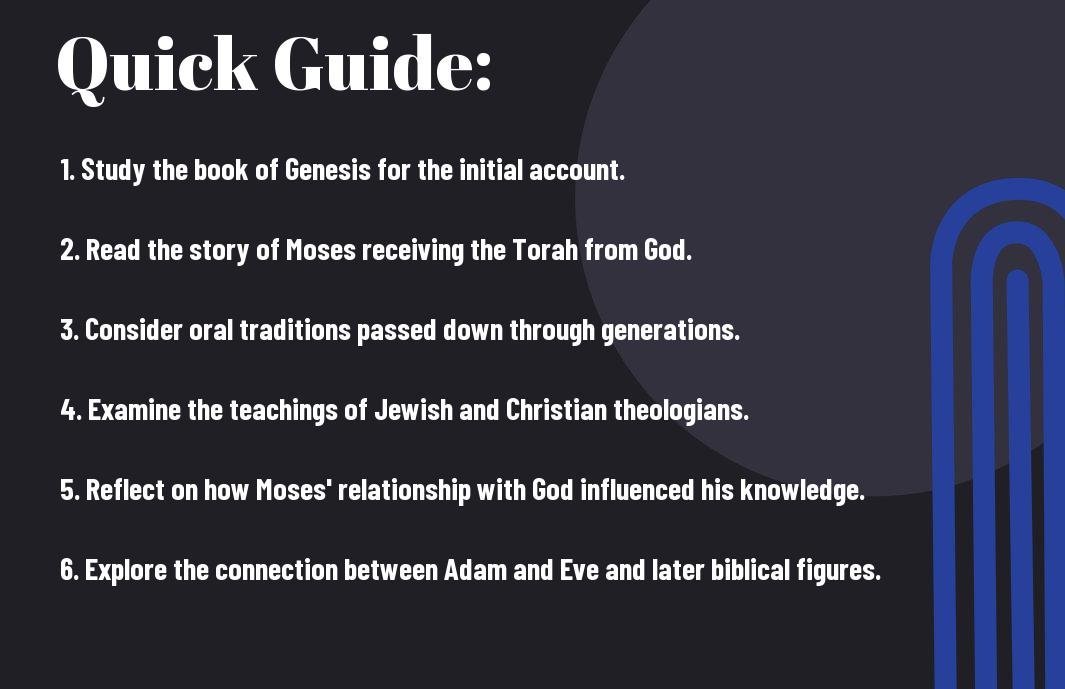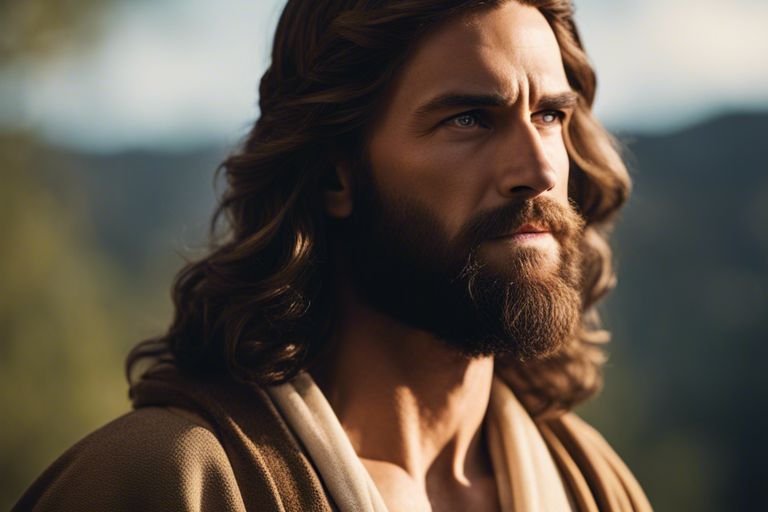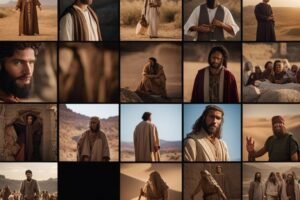Perusing the intricate narratives of the Bible, one might often wonder how certain figures like Moses had knowledge of events that occurred long before their time. In this guide, I will delve into the biblical account of Adam and Eve and explore how Moses could have known about their story. By critically examining the biblical narrative and the rich tradition of oral storytelling and ancient texts, I will shed light on the fascinating ways in which knowledge was passed down and preserved. Additionally, I will discuss the implications of this knowledge for our understanding of history and the human experience, and the important lessons we can glean from these ancient tales.
Key Takeaways:
- Moses as the author: According to biblical tradition, Moses is considered the author of the first five books of the Bible, including the story of Adam and Eve. This raises questions about how Moses could have known about events that predates his own life.
- Divine inspiration: One explanation for how Moses knew about Adam and Eve is the belief that he was divinely inspired or received direct revelation from God. This understanding aligns with the belief in the divine origin of the Bible.
- Oral tradition: It is possible that knowledge of Adam and Eve was passed down through oral tradition, and that Moses incorporated this knowledge into his writings. This suggests that the story was preserved and transmitted through generations before being recorded in writing.
- Historical context: Understanding the historical and cultural context in which Moses lived is important in unraveling how he knew about Adam and Eve. This includes considering the influence of other ancient Near Eastern traditions and the events that shaped his worldview.
- Parallels with other ancient texts: The story of Adam and Eve in the Bible bears similarities to other ancient myths and creation narratives. Exploring these parallels can provide insights into how the knowledge of Adam and Eve may have been accessible to Moses through interaction with other cultures.
Biblical Narrative of Adam and Eve
The story of Adam and Eve is a foundational narrative in the Bible, found in the book of Genesis. It recounts the creation of the first human beings, their life in the Garden of Eden, and their eventual expulsion from paradise. The narrative has had a profound impact on Western civilization and has been the subject of much theological, philosophical, and artistic reflection.
Creation and Fall of Adam and Eve
The biblical narrative of Adam and Eve begins with the creation of the first man and woman by God. Adam and Eve were placed in the Garden of Eden, a paradise where they lived in harmony with God and nature. However, their idyllic existence was shattered when they disobeyed God’s command not to eat from the tree of the knowledge of good and evil. This act of disobedience, known as the Fall, resulted in their expulsion from the Garden and brought sin and death into the world.
The Role of Moses in Preserving the Narrative
The story of Adam and Eve, like many other narratives in the Bible, has been transmitted through the generations via oral tradition and eventually recorded in written form. The role of Moses, traditionally attributed to the authorship of the first five books of the Bible, including Genesis, is significant in preserving and transmitting the narrative of Adam and Eve to subsequent generations. Through the inspiration of God, Moses ensured the preservation of this foundational story, which continues to shape the beliefs and values of people today.
Tradition of Adam and Eve in Jewish and Christian Texts
Any discussion of how Moses knew about Adam and Eve must begin with an exploration of the tradition of these two figures in Jewish and Christian texts. In the Hebrew Bible, which is the foundation of both Judaism and Christianity, the story of Adam and Eve is found in the book of Genesis. This narrative introduces Adam and Eve as the first man and woman created by God and describes their life in the Garden of Eden, as well as their subsequent expulsion from paradise due to disobedience to God’s command.
Interpretations and Commentary on the Story
Throughout history, the story of Adam and Eve has been subject to a wide range of interpretations and commentaries within both Jewish and Christian traditions. These interpretations often center on the themes of human nature, free will, and the nature of sin. Many scholars and theologians have offered their own insights into the story, shedding light on its deeper meaning and relevance to human existence.
Influence on Religious Beliefs and Practices
The story of Adam and Eve has had a profound influence on the religious beliefs and practices of both Judaism and Christianity. It has been used to shape theological doctrines, such as the concept of original sin in Christian theology, as well as ethical and moral teachings about human nature and the consequences of disobedience. This narrative continues to be a powerful and influential part of the religious traditions that have been shaped by it.
How Did Moses Know About Adam and Eve
To understand how Moses knew about Adam and Eve, it is important to consider the historical context and the oral tradition that was prevalent during that time. By examining the possible sources of information available to Moses, we can gain insight into how the narrative of Adam and Eve was preserved and passed down through generations.
Historical Context and Oral Tradition
During the time of Moses, storytelling and oral tradition were the primary means of preserving historical and religious narratives. The Israelites relied on oral transmission of knowledge, and it was through this tradition that the stories of Adam and Eve were likely preserved. The historical context of oral tradition provides a crucial backdrop for understanding how Moses came to know about Adam and Eve and how the narrative was preserved over time.
Possible Sources of Information for Moses
As a figure of great significance in religious history, Moses would have had access to a variety of sources that contributed to his knowledge of Adam and Eve. These sources may have included the oral traditions passed down from previous generations, as well as divine revelation and inspiration. It is also possible that Moses had access to written records or historical accounts that were available during his time. By considering these potential sources, we can better understand how Moses came to possess knowledge of the narrative of Adam and Eve.

How Did Moses Know About Adam and Eve – Exploring Biblical Narrative and Tradition
Following this exploration of the biblical narrative and tradition, it is clear that Moses had access to the story of Adam and Eve through divine revelation and oral tradition. The intricate details and theological significance of the story suggest that Moses was inspired and guided by God to include it in the book of Genesis. Additionally, the influence of ancient Near Eastern creation myths on the biblical account further underscores the possibility of Moses incorporating this narrative into the Hebrew Scriptures. As a result, we can confidently assert that Moses knew about Adam and Eve through a combination of divine inspiration and traditional sources, and his preservation of this story has had a profound impact on religious and cultural history.
FAQ
Q: How did Moses know about Adam and Eve?
A: Moses, as the author of the first five books of the Bible, likely received this information through divine revelation from God. The story of Adam and Eve is believed to have been passed down orally through generations and eventually recorded by Moses under the guidance of the Holy Spirit.
Q: What evidence supports the belief that Moses knew about Adam and Eve?
A: The account of Adam and Eve is found in the book of Genesis, which is traditionally attributed to Moses. Additionally, the themes and motifs present in the Adam and Eve story are woven throughout the entire Pentateuch, indicating a consistent narrative thread that is likely rooted in the authorship of Moses.
Q: Are there any biblical traditions that support the idea that Moses knew about Adam and Eve?
A: Yes, there are numerous Jewish and Christian traditions that affirm the belief that Moses was aware of the story of Adam and Eve. These traditions often emphasize the role of divine inspiration and oral tradition in conveying this knowledge to Moses.
Q: How does the story of Adam and Eve fit into the larger biblical narrative as understood by Moses?
A: The story of Adam and Eve serves as the foundation for many key theological concepts such as the origin of sin, the nature of humanity, and God’s plan for redemption. Moses likely understood this narrative as foundational to his understanding of God’s covenant with humanity and the eventual coming of the Messiah.
Q: What significance does Moses knowing about Adam and Eve have for believers today?
A: Understanding the origins of the Adam and Eve story in the context of Moses’ authorship provides believers with a deeper appreciation for the interconnectedness of biblical narratives. It also serves as a reminder of the enduring relevance and authority of the biblical text in shaping our understanding of God and his purposes for humanity.










